
Let’s get this out of the way: most VPNs for China do not work – and most of the “best China VPN” guides do not tell you this. Having spent lots of time in Shanghai, I’ll give you the facts on the best VPNs for China and what you need to do to ensure a reliable connection.
Imagine traveling or living in China and suddenly, your favorite websites and apps are inaccessible. Frustrating, right? Well, you’re not alone. Millions of people in China face internet censorship, which makes using a VPN a necessity. Aside from that, there are crucial privacy and security reasons for using a VPN in China.
So how do you find the best VPN for China? In this detailed report, we’ll guide you through the top VPNs for China and share insider information on how to use them the right way to get around censorship and restrictions. So get ready to bypass internet censorship and the Great Firewall and regain your online freedom with more privacy!
Tested VPNs for China that are working now
After rigorous testing and evaluation, we have curated a list of the best VPNs for China. These VPNs have proven their ability to bypass the Great Firewall and offer reliable performance. Our top picks are:
- NordVPN – Best overall VPN for China with fast speeds, reliable apps, excellent support for streaming, plus extra privacy and security features (with a 74% off coupon)
- Surfshark – A budget-friendly VPN for China with great features and fast speeds
- VyprVPN – A reliable VPN for China
- VPN.ac – Secure VPN for China with good apps
- ExpressVPN – User-friendly VPN for China, but more expensive
- Astrill VPN – A good VPN for China with decent speeds
Considerations when choosing the best VPN for China:
- Finding the best VPN for China in 2024 with strong security, fast speeds, and reliable access to restricted content.
Considering technical security, privacy policies, features, and unblocking capabilities when choosing a VPN for China.
Taking safety measures to minimize the risks of using a VPN in China. Alternate methods exist, but they may not provide the same level of protection as the VPNs we recommend.
Navigating the intricacies of China’s internet restrictions can be daunting, but with the right VPN, you can regain access to the web without worry. The best VPNs for China prioritize security, speed, and the ability to bypass the Great Firewall.
Let’s dive into some of the top providers that excel in these areas.
NordVPN: Best VPN for China that consistently works
| VPN | NordVPN |
| Based in | Panama |
| Logs | No logs (audited) |
| Price | $2.99/mo. |
| Support | 24/7 live chat |
| Refund | 30 days |
| Website | NordVPN.com |
NordVPN stands out as the best overall VPN for China due to its outstanding security, swift speeds, and extensive VPN server network for reliable access to restricted content. Being unaffiliated with China or any Chinese entity, NordVPN ensures private internet access for its users.
NordVPN offers an impressive range of features, including:
- Dependable access to restricted content through the fast, secure NordLynx protocol
- The fastest speeds we have ever recorded during speed testing (755 Mbps)
- Specialized VPN server types for advanced use cases
- Reliable kill switches and private DNS to protect your privacy
- Audited no-logs policy ensuring your privacy during and after internet use
- Powerful Threat Protection feature that blocks ads, malware, and much more
- Excellent performance when unblocking streaming media sites and downloading torrents
- 30-day money-back guarantee
- 24/7 live chat support
- Based in privacy-friendly Panama
See all NordVPN features here >>
NordVPN is an extremely capable VPN service that consistently ranks at or near the top in every test we conducted for this China VPN guide. Here is the NordVPN desktop app we tested out for this China VPN guide:
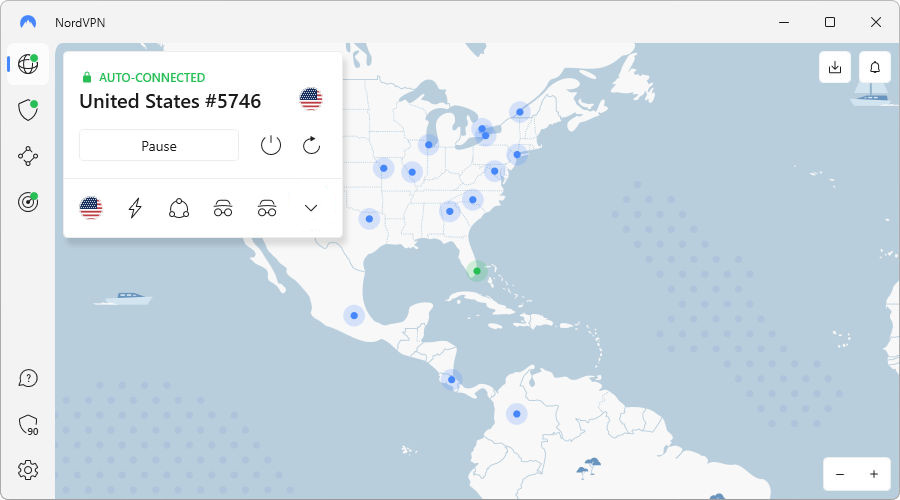
Now we’ll show you exactly how to use NordVPN in China.
How to use NordVPN in China
To use NordVPN in China, follow these simple steps:
- Go to the NordVPN website and sign up for a subscription (use the discount coupon for the best prices).
- Download the NordVPN apps for the devices you want to use in China.
- Enter your login credentials in the app.
- Select Settings (the gear icon circled in red below) to display the Settings page.
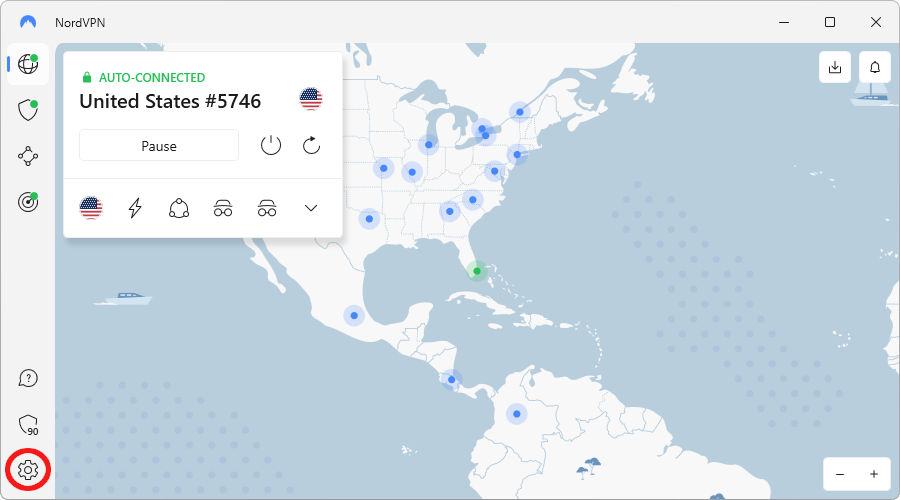
5. On the Settings page, select Connection to open the Connection settings page.
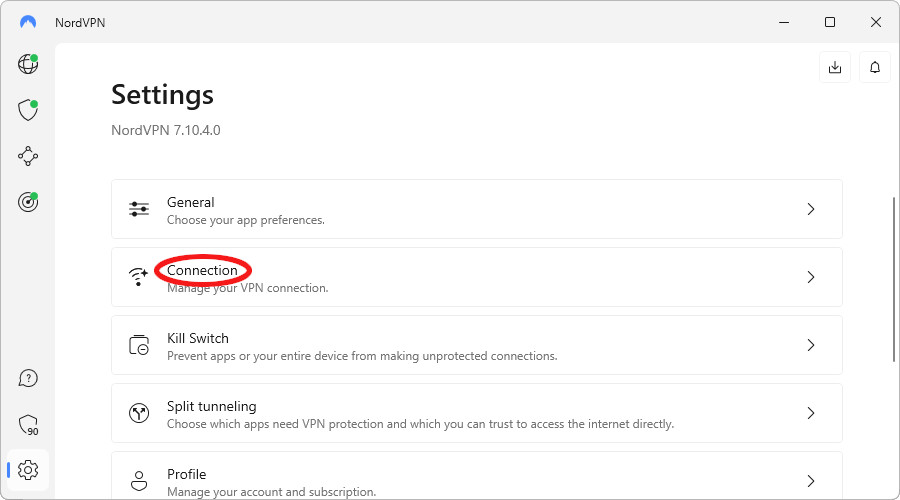
6. On the Connection settings page, in the VPN protocol option, select NordLynx as shown below.
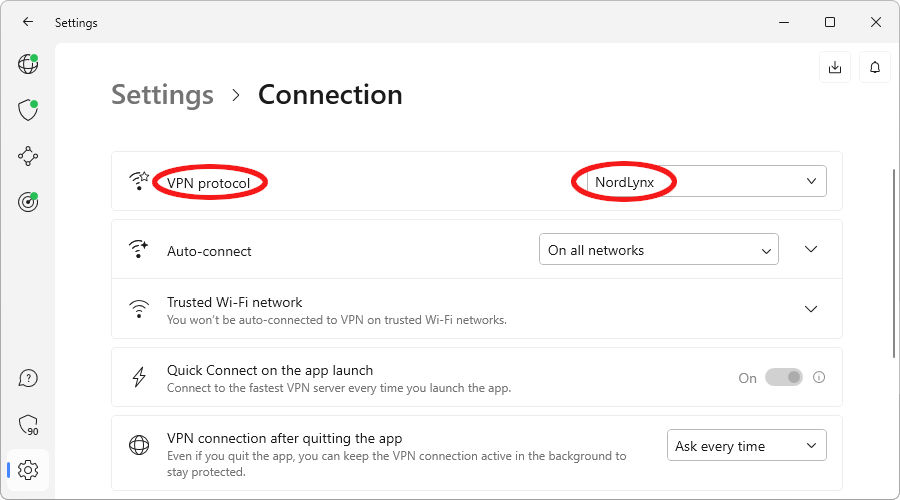
7. On the Connection settings page, in the VPN protocol option, select NordLynx as shown below.
8. NordVPN is now configured to always use NordLynx, which gives you the best connectivity when in China.
9. Return to the main screen and select Quick Connect to connect to the best nearby NordVPN server.
10. Enjoy using NordVPN in China.
All NordVPN subscriptions support up to 6 simultaneous connections and have a 30-day money-back guarantee.
+ Pros
- User-friendly and reliable apps
- Double VPN and Onion Over VPN servers
- Passed numerous 3rd-party audits
- Strong encryption standards with full support for WireGuard
- Works with Netflix and many streaming sites
- Threat Protection feature to block ads, trackers, and malware
- Professional 24/7 live chat support
- Consistently fast speeds
- Dedicated RAM-servers with 10 Gbps bandwidth channels
– Cons
- Best discounts only available with 2-year plans
NordVPN Cyber Deal is Live:
Get 74% Off NordVPN (drops the price to $2.99 per month) plus 3 months FREE:
(Coupon is applied automatically.)
See the new and updated NordVPN review for more info and test results.
Surfshark: Fast, budget-friendly VPN with unlimited connections
| Website | Surfshark.com |
| Based in | The Netherlands |
| Logs | No logs (audited) |
| Price | $1.99/mo. |
| Support | 24/7 live chat |
| Refund | 30 days |
| Deal | 87% Off Coupon |
Surfshark VPN is the next service on our list of the best VPNs for China. This VPN offers lots of features, user-friendly and reliable VPN apps, a very secure server network, and incredible connection speeds, with the WireGuard VPN protocol.
Surfshark is a cost-effective VPN service provider that offers the following advantages:
Swift speeds and dependable performance for accessing restricted content in China
Unlimited device connections on one subscription
- Audited no-logs policy
- Support for the WireGuard VPN protocol
Automatic kill switch and private DNS
Support for P2P filesharing and torrenting
- Ability to unblock most streaming media sites
- Built-in VPN ad blocker
See all Surfshark VPN features here >>
Surfshark provides you with excellent performance and smooth, uninterrupted browsing and streaming with the fast, secure WireGuard VPN protocol.
Priced under $2.50/month with a 2-year plan and unlimited simultaneous connections, Surfshark offers tremendous bang for the buck. Like our #1 pick NordVPN, Surfshark gives you a 30-day money-back guarantee and 24/7 live chat support.
Surfshark is a great VPN for China and you can get it for the best price available using this discount coupon:
Surfshark’s NoBorders feature
Surfshark has a neat feature called NoBorders that allows this VPN to work in China, when other VPNs are getting blocked. If your Surfshark app detects any kind of restrictions on the network it can automatically turn NoBorders on. So most of the time you don’t even have to think about it.
However, given the effort the Chinese government is putting into crushing VPN use, it seems wise to manually activate NoBorders mode before trying to connect to a VPN server. This should reduce the risk of the country’s censorship tech detecting Surfshark in the time it takes for the Surfshark app to detect restrictions and switch to NoBorders mode.
Here are step-by-step instructions on how to use Surfshark in China.
How to use Surfshark VPN in China
1. Go to the Surfshark website and sign up for a subscription.
2. Download the Surfshark apps for the devices you want to use in China.
3. Enter your login credentials into the VPN app.
4. Before you connect to a VPN server, enable NoBorders mode.
5. In the Surfshark app, select the Settings icon. It is circled in red below.
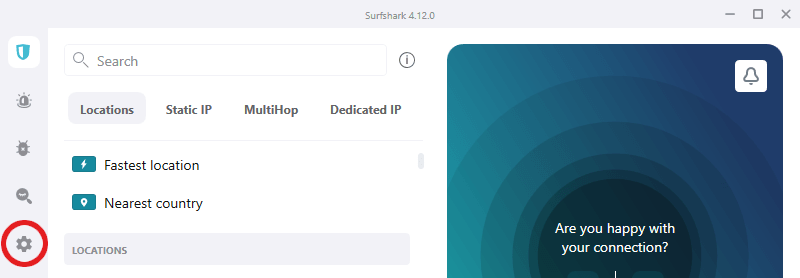
6. On the Settings page, select VPN Settings. Scroll down until you see the NoBorders option. Set the NoBorders toggle to On, as shown in the image below.
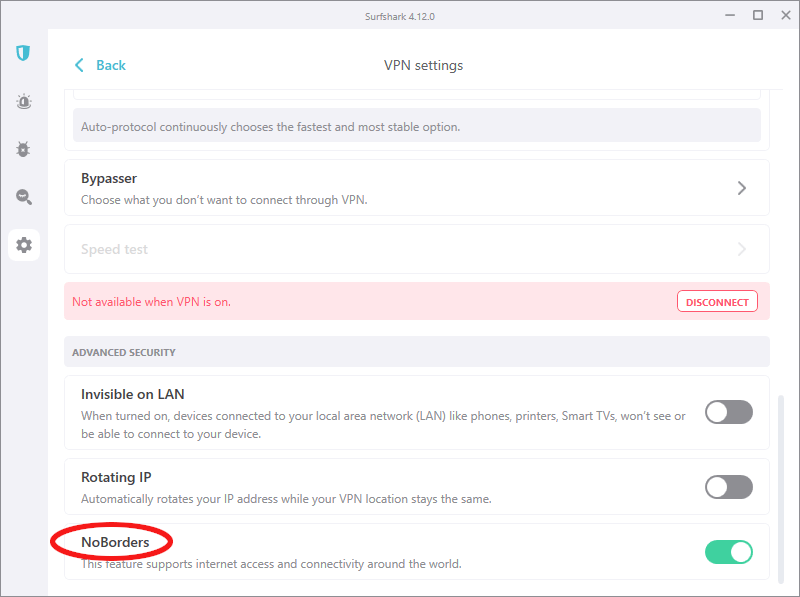
7. Once you activate NoBorders mode you are ready to connect to a VPN server and go about using the VPN as normal.
8. Enjoy using Surfshark VPN in China.
All Surfshark subscriptions support an unlimited number of simultaneous connections and have a 30-day money-back guarantee. And at least than $3 per month, it is one of the best cheap VPNs on the market.
+ Pros
- Unlimited connections
- User-friendly apps for all devices and operating systems
- CleanWeb feature to block ads, trackers, and malware
- Works great with Netflix and many other streaming services
- 24/7 live chat support
- Strong encryption and security features (audited)
– Cons
- Limited support for VPN routers
- Above average monthly prices
Surfshark VPN Coupon:
Get 87% off Surfshark VPN plus an additional 4 months extra with the coupon below:
(Coupon is applied automatically; 30 day money-back guarantee)
Check out this Surfshark VPN review for more info.
VyprVPN: A Reliable VPN for China
| VPN | VyprVPN |
| Based in | US |
| Logs | No logs (audited) |
| Price | $5.00/mo. |
| Support | 24/7 live chat |
| Refund | 30 days |
| Website | VyprVPN.com |

VyprVPN, a Switzerland-based VPN that performed well in our tests for unblocking content and getting past the Great Firewall. It offers the following features:
Proprietary Chameleon VPN protocol that masks VPN traffic, making it invisible to the Great Firewall’s deep packet inspection technology.
- Excellent speed and uptime due to its company-owned servers
- Full WireGuard support
- Audited no-logs policies
Accepting Alipay as a payment gateway in China and offering unlimited simultaneous connections, VyprVPN caters to users in the country. VyprVPN offers user-friendly apps for major operating systems and devices, ensuring that a wide range of users can take advantage of VyprVPN’s features.
You can get a discounted subscription to VyprVPN by clicking the link below:
How to use VyprVPN in China
Here are step-by-step instructions for how to use VyprVPN in China:
- Go to the VyprVPN website and sign up for a subscription.
- Download the VyprVPN apps for the devices you want to use.
- After you download the apps and log in with your account credentials, go to Options/Preferences > Protocol > then select Chameleon for the VPN protocol. (This is the obfuscation/stealth VPN feature.)
- Then connect to the fastest server, or pick a server location from the map.
- Enjoy using VyprVPN in China and getting through the Great Firewall.
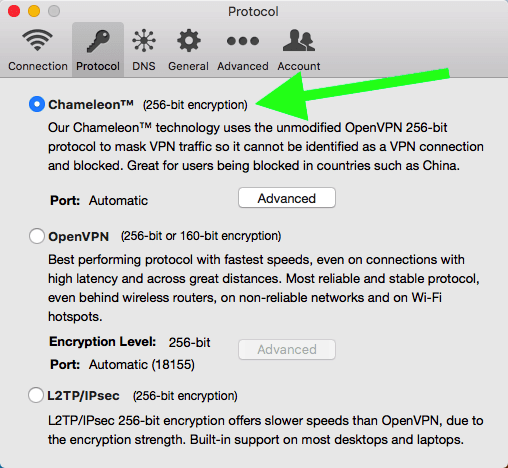
+ Pros
- Secure applications with strong encryption
- Excellent speeds with all servers tested
- Full WireGuard support directly in VPN apps
- Chameleon protocol (obfuscation)
- Entirely self-owned server network
- User-friendly apps for many devices/platforms
- Based in Switzerland with an audited no-logs policy
– Cons
- Requires name for registration
- No cryptocurrency payment options
- Above-average prices
- Fewer features than some other leading VPNs
See our VyprVPN review for more details and test results.
VPN.ac: Advanced features for defeating restrictions in China
| Name | VPN.ac |
| Location | Romania |
| Price | $3.75/mo. |
| Logs | No logs |
| Support | |
| Website | VPN.ac |
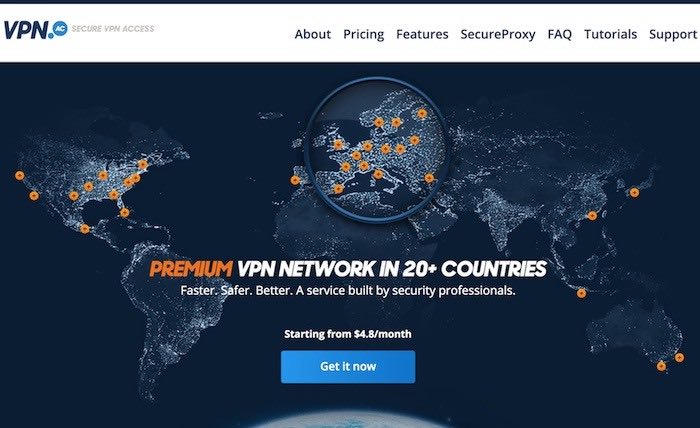
VPN.ac is a viable solution for bypassing restrictions in China due to its capacity to defeat censorship, robust encryption, and advanced features to ensure user privacy. Among various VPN providers, VPN.ac stands out as an optimal choice for streaming and torrenting while safeguarding user privacy with sophisticated features. As a reliable China VPN, it offers a secure and unrestricted online experience.
Note: VPN.ac has not completed the development of a Linux app. If you need Linux support choose one of the other VPNs listed here. Surfshark is one of the best VPNs for Linux available today.
The service offers a range of features such as a kill switch, DNS leak protection, and more.
While VPN.ac may have some limitations in unblocking streaming services, such as limited success unblocking Netflix regions, these minor drawbacks do not overshadow its overall excellence. With exceptional performance, robust security measures, and affordable pricing, VPN.ac stands out as one of the best VPNs for use in China.
How to use VPN.ac in China
To use VPN.ac in China, just follow these steps:
- Go to the VPN.ac website and select a subscription plan.
- Download the apps for the devices you want to use in China, then log in through the app with your account credentials.
- Within the application, go to ADVANCED > and then turn on the, I am in China or other censored country.
- Click CONNECT and select one of the servers from the list called CHINA OPTIMIZED. After selecting one of the “China Optimized” server locations, toggle the VPN connection to ON.
- Enjoy using VPN.ac in China and having unrestricted internet.
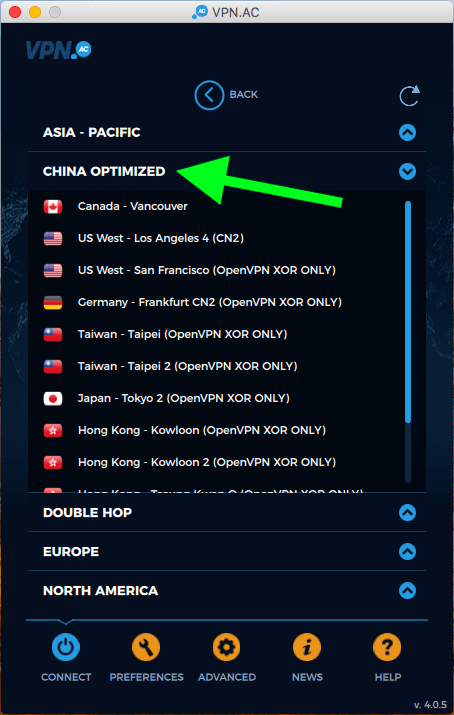
+ Pros
- Dedicated bare-metal servers with self-hosted encrypted DNS
- Excellent speeds with plenty of available bandwidth
- Multi-hop (double VPN) server configurations
- Obfuscation features with many different encryption options
- Secure proxy browser extensions
- WireGuard VPN support
– Cons
- Does not work well for streaming
- Fewer features than other leading VPNs
- Limited refund window (7 days)
See our VPN.ac review for more info and test results.
ExpressVPN – A secure and reliable VPN for China
| Website | ExpressVPN.com |
| Based in | British Virgin Islands |
| Logs | No logs (audited) |
| Price | $6.67/mo. |
| Support | 24/7 live chat |
| Refund | 30 days |
| Deal | 49% Off Coupon |

ExpressVPN remains a great VPN for people in China if you want to easily unblock websites and also achieve great speeds. While it is slightly more expensive than some other VPNs, it remains the best solution for those in China looking for fast and reliable connections.
ExpressVPN is yet another strong VPN for China, offering:
Simple and secure access to blocked content
Server locations in 94 countries
Strong encryption
Its proprietary Lightway protocol, which ensures rapid connections and a smooth, uninterrupted browsing experience
- Easy to use, secure VPN apps for most operating systems and devices
- Network Lock kill switch and private DNS
Users also get 24/7 live chat support from an excellent team of professionals. While not as fast as some services, and more expensive than many, ExpressVPN provides a comprehensive solution for users in China.
Note: ExpressVPN does not post the details of using the service in China. You will need to contact their support team to get the current instructions.
In addition to the above benefits, ExpressVPN offers a 30-day money-back guarantee, making it risk-free to try.
How to use ExpressVPN in China
To use ExpressVPN in China, just follow these steps:
1. Go to the ExpressVPN website and sign up for a subscription.
2. Log in to your account and download the software for the devices you want to use with the VPN.
3. Open the ExpressVPN app, then enter the activation code (from your account page).
4. Select the 3-bar menu in the top left corner of the ExpressVPN app window. In the menu that appears, select Options.
5. In the Options page that appears, select the Protocol tab. In the next page, select Automatic.
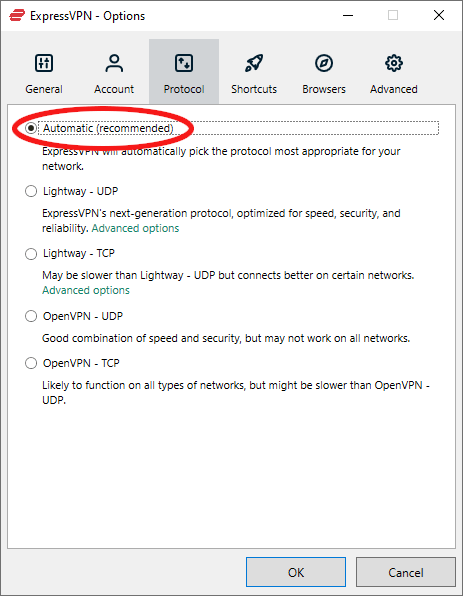
6. Click OK. You are now ready to connect to one of the servers designated for China users.

7. Try connecting to these options in the order they are listed. Once you can connect to one of them successfully, you are ready to go.
8. Enjoy using ExpressVPN in China and unblocking all online content.
+ Pros
- User-friendly and secure apps
- Split tunneling feature (for macOS, Windows, and routers)
- Works with Netflix and most streaming services
- 24/7 live chat support
- Passed independent third-party audits for security and no-logs
- Very large server network
– Cons
- Above average prices
- Fewer features than other leading VPNs
Check out our ExpressVPN review for more test results and information.
Astrill VPN – A reliable VPN for China
| VPN | Astrill VPN |
| Based in | Liechtenstein |
| Logs | No logs |
| Price | $15.00/mo. |
| Support | Live chat; Email |
| Refund | None! |
| Website | Astrill.com |

Astrill VPN is a popular choice in China, offering dedicated tools for the country and advanced security features such as an ad-blocker, split tunneling, and a kill switch. It is also one of the older VPN services, having been around since 2009.
Astrill VPN is compatible with:
Windows
MacOS
iOS
Android devices
In addition to these features, Astrill VPN also offers a StealthVPN protocol which is designed to bypass the Deep Packet Inspection (DPI) used by the Great Firewall of China. This makes it an excellent choice for internet users in China who need to bypass restrictive internet censorship.
Moreover, Astrill VPN provides 24/7 customer support, which is a significant advantage for users who may encounter issues or have queries about the service. The customer support team can be reached via live chat, email, and phone, ensuring that help is always at hand.
One of the biggest drawbacks with Astrill VPN, however, it is more expensive than other options. Prices start at $15 per month with the annual plan, or $12.50 a month with the two-year plan. And finally, the monthly plans are $30, which is more expensive than any other China VPNs in this guide.
Furthermore, despite its advanced security features, it has limitations when it comes to server locations. This could affect connection speed and reliability depending on your geographical location. Lastly, while Astrill VPN offers a 7-day free trial, this is significantly shorter than the 30-day money-back guarantees offered by many competitors, providing less time for users to evaluate the service.
Despite its higher price point, Astrill VPN offers a 7-day free trial, giving potential users an opportunity to test the service before committing to a subscription. This can provide reassurance and allow users to assess whether the VPN meets their specific needs and expectations.
+ Pros
- Stealth VPN feature
- Extra security features such as an ad-blocking, split tunneling, and a kill switch.
- 24/7 customer support
– Cons
- Far more expensive than other VPNs
- Limited server network
- No refunds
How to Choose the Right VPN for China
When selecting the right VPN for China, it’s crucial to consider the following factors:
Technical security
Privacy policies
Features
Unblocking capabilities
Server locations
VPN protocol
Cost-effectiveness
Ensuring tight security measures are in place to prevent government monitoring is essential.
Additionally, customer support plays a vital role in choosing a VPN for China, as it is not uncommon to require help from support personnel to find the most suitable servers on any given day.
Another significant consideration for many China VPNs is obfuscation technology, which hides your VPN traffic by making it look like regular internet traffic. The best option for this is to use NordVPN or Surfshark with their obfuscation technology.
How to Select the Right VPN Server for China
Choosing the best server location for optimal speed and access to blocked content in China is crucial. When using a VPN in China, it’s best to connect to countries with server locations in close proximity, like:
Hong Kong
Taiwan
Japan
South Korea
Singapore
Connecting to servers in nearby countries can provide faster speeds and reduced latency, ensuring a smoother and more reliable internet experience with unlimited simultaneous connections.
Additionally, these server locations are more likely to have access to the content and services you wish to access from China. By selecting a VPN provider with servers in these countries, you can ensure the best possible VPN experience while in China.
VPN protocols to use in China
VPN protocols are the methods by which your device connects to a VPN server. Different protocols use different encryption standards and connection speeds, which can have a significant impact on the performance and security of your VPN connection.
Choosing the correct VPN protocol for use in China is key. Secure and protocols, such as NordVPN’s StealthVPN technology and using the obfuscated servers will help to ensure you can bypass the Great Firewall and maintain a reliable connection. You can select the protocol you want to use with NordVPN directly in the settings as you can see below.
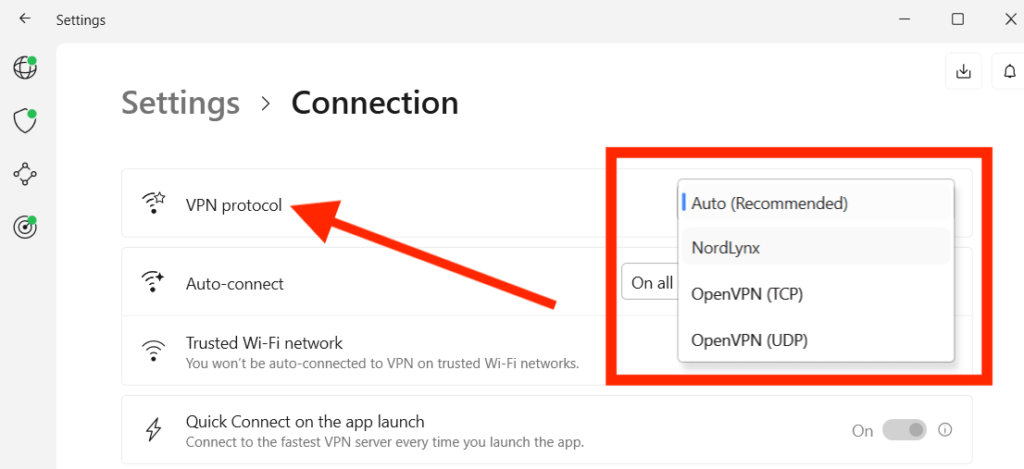
WireGuard and OpenVPN are also viable options, but they may not be as effective in bypassing the Great Firewall due to the Chinese government’s active efforts to block VPN traffic via deep packet inspection.
By choosing a VPN provider with a suitable protocol for use in China, you can ensure a secure and reliable connection while bypassing internet restrictions.
How to Be Safe Using a VPN in China
To use a VPN safely in China, it’s important to choose the right encryption protocol, such as WireGuard, IKEv2, or OpenVPN. You will want to pay careful attention to the recommendations provided by the VPN service you choose and follow them meticulously.
Activating your VPN’s kill switch is another way to ensure safety when using a VPN in China. You will want to get your VPN installed and configured according to the provider’s directions before you enter China. The country has blocked access to the websites of many VPNs that fail to aid the government in censoring and tracking Chinese citizens.
Blocked Websites and Services in China

Here are just some of the sites that are currently blocked in China, but will be accessible with a VPN:
- All Google websites (Google Search, Gmail, Google Maps, etc.)
- Youtube
- Yahoo! Taiwan and Hong Kong
- Skype
- BBC (look here to find the best VPN for BBC iPlayer)
For a more complete list of blocked sites, see Wikipedia’s article on websites blocked in mainland China.
Internet Censorship in China
The issue of Internet censorship in China is complex and constantly changing. The government heavily regulates the content accessible to its citizens, restricting access to international websites and apps such as Google, Facebook, and YouTube. This level of censorship has led to the widespread use of VPNs in the country to bypass restrictions and access blocked content.
Indeed, for internet users in China, using a VPN to access both local platforms and international websites and apps like Google, Facebook, and YouTube has become a necessity. It’s important to recognize the extent of internet censorship in China and the vital role VPNs play in ensuring free access to information.
The Great Firewall of China
The Great Firewall of China refers to the country’s internet censorship system, which employs various techniques to block VPNs and limit access to websites and services. Some of these techniques include:
IP blocking
DNS tampering
Keyword filtering
Deep packet inspection
URL filtering
Manual enforcement
The Great Firewall poses significant challenges for VPN users in China, hence the need to choose a dependable VPN provider capable of overcoming these restrictions.
How VPNs get around the Great Firewall
VPNs bypass the Great Firewall by encrypting data and hiding the destination of internet traffic, using additional encryption and obfuscation techniques. Encryption ensures that your data remains secure and unreadable by third parties, while obfuscation disguises VPN traffic as regular web traffic, making it difficult for the Great Firewall to detect and restrict VPN connections. Some VPNs also employ the OpenVPN scramble extension to obfuscate packet headers, further preventing detection by automated network defense systems.
With a VPN that has robust encryption and obfuscation capabilities, you can successfully circumvent the Great Firewall and access restricted content in China.
How China blocks VPNs with its firewall
China’s stateful firewall blocks VPNs through various methods, including wiretapping internet traffic, blackholing sites and services, and actively probing VPN connections. This aggressive approach to blocking VPNs has led to the widespread use of obfuscated servers and other advanced security measures by VPN providers to bypass these restrictions. However, it’s important to note that not all VPNs are successful in circumventing the Great Firewall, and using a VPN in China carries some risk.
In the end, the choice of a trustworthy VPN provider, known for its success in bypassing the Great Firewall and guaranteeing a secure, reliable connection in China, is of utmost importance.
In the end, the choice of a trustworthy VPN provider, known for its success in bypassing the Great Firewall and guaranteeing a secure, reliable connection in China, is of utmost importance.
Legal concerns and risks of using a VPN in China
Although China doesn’t want people to use VPN software to avoid government blocks, it isn’t clear what the penalties are for being caught doing so. Foreign nationals are probably not punished harshly, but Chinese citizens will likely be punished and the infraction will probably hurt their social credit score.
The Ministry of Industry and Information Technology only blocks unauthorized VPNs used for illicit activities, so using a trustworthy VPN and taking safety precautions can help minimize the chances of getting in trouble for using a VPN in China.
Alternatives to VPNs for bypassing the Great Firewall
While VPNs are the most popular method to bypass China’s internet restrictions, alternative methods like ShadowSOCKS, proxies, and Tor exist, although their success is limited. Shadowsocks is a secure proxy protocol designed to circumvent the Great Firewall of China, utilizing encryption to ensure a secure internet connection. Tor is a free and open-source software that enables users to access the internet anonymously, allowing them to bypass censorship and access blocked websites.
These alternatives, however, don’t provide the same level of security, privacy, and reliability as a reputable VPN. Given the risks, we urge you to use one of the recommended VPNs in China, rather than hoping some other method will let you get around the Great Firewall and keep your activities concealed from the authorities.
How to Set Up and Use a VPN in China
The process of setting up and using a VPN in China is quite simple. First, choose a reliable VPN provider that offers strong security features and has a proven track record of bypassing the Great Firewall. Download the VPN app onto your device before arriving in China, as most VPN websites are blocked in the country.
Once the app is installed, follow these steps:
Launch the app and sign in with your account credentials.
Connect to a server located in a geographically close country such as Hong Kong, Taiwan, or Japan for optimal performance.
Once connected, you can access blocked websites and services, and enjoy unrestricted internet access in China.
What you should know before using a VPN in China
Prior to using a VPN in China, awareness of potential risks and necessary precautions is crucial. Avoid free VPNs, as they may not have the necessary encryption and protocols to bypass the Great Firewall and could put your privacy and security at risk. Use obfuscated servers when possible to make your VPN usage less detectable by the Chinese government and ensure a more secure connection.
Be prepared for the possibility of a VPN connection failure and have backup options in place, such as alternative VPN providers or server locations. By taking these precautions, you can minimize the risks associated with using a VPN in China and enjoy a safer, more secure browsing experience.
Risks of using free VPNs and proxies in China

There are several risks associated with using a free VPN and proxies in China, such as unreliable performance, restricted server choices, and potential privacy concerns. Free VPNs often lack the necessary security protocols to bypass the Great Firewall, making them ineffective for accessing blocked content. Moreover, the performance of free VPNs can be inconsistent, with slower speeds and frequent disconnections being common issues. This could disrupt your online activities, especially if you’re engaged in tasks that require a stable connection, such as video conferencing or streaming.
Additionally, free VPNs usually have a limited number of servers, which can lead to overcrowded servers and further slow down your internet speed. This limited selection of servers can also make it harder to find a server that effectively bypasses China’s internet restrictions.
On top of all these, free VPNs may monitor users’ online activities and sell collected data to third parties, putting your privacy at risk. This is because free VPN services need to generate revenue somehow, and selling user data is one way to do that. Therefore, even though you might be bypassing internet restrictions, you could be exposing your online activities to unknown third parties.
Proxies, on the other hand, may not provide the same level of security as a VPN, making them more susceptible to detection and blocking by the Great Firewall. While proxies can help you access blocked websites, they do not encrypt your internet traffic, leaving your data exposed to potential interception and surveillance. This makes them a less secure option for maintaining your online privacy.
To ensure a safe and reliable internet experience in China, it’s important to choose a reputable VPN provider with strong security features and a proven track record of bypassing the Great Firewall.
How to get a Chinese IP address
Obtaining a Chinese IP address is possible through the use of a VPN provider with servers in China or virtual IP addresses. Most VPNs do not have servers in China due to the country’s strict internet regulations, but some providers offer virtual IP addresses or servers in neighboring regions, such as Hong Kong and Taiwan.
To get a Chinese IP address, follow these steps:
Choose a VPN provider with servers in China or virtual IP addresses.
Download and install the VPN app onto your device.
Launch the VPN app and sign in with your account credentials.
Connect to a server located in China or a virtual IP address to obtain a Chinese IP address.
Tips for Optimizing Your VPN Experience in China
Consider these tips to enhance your VPN experience in China. First, choose the right protocol for your needs. OpenVPN (desktop) and IKEv2 (mobile devices) are recommended for use in China, as they offer a good balance of speed and security. Second, use obfuscated servers when possible to make your VPN usage less detectable by the Chinese government and ensure a more secure connection.
Lastly, connect to server locations that are geographically close to China, such as Hong Kong, Taiwan, and Japan, for optimal performance and reduced latency. By following these tips, you can improve your VPN experience in China and enjoy a more secure and reliable internet connection.
How we test VPNs for China: The Detailed Process
We adopt a comprehensive testing methodology to assess the performance and reliability of VPNs in China. As a part of our commitment to providing accurate and reliable information, our team stays updated with the latest news from trusted VPN providers regarding their connection status in China.
Our VPN test process is rigorous and systematic. We test each of the 32 VPNs based on specific criteria that we believe are crucial for a VPN to be effective in China. These criteria include:
- Speed: The speed of a VPN can greatly affect your online experience, especially when it comes to activities that require high bandwidth, such as streaming videos or playing online games. We conduct multiple speed tests to ensure the VPNs can deliver satisfactory performance.
- Security: A VPN’s primary function is to provide a secure connection to the internet. We check each VPN’s security features, such as encryption standards, kill switches, and leak protection, to ensure they can effectively protect your online privacy and security.
- Streaming capabilities: Many people use VPNs to access geo-restricted content from streaming platforms. We test each VPN’s ability to unblock popular platforms like Netflix, BBC iPlayer, and Hulu.
- Ability to bypass the Great Firewall: This is perhaps the most important criterion for VPNs in China. We verify each VPN’s ability to bypass the Great Firewall and provide access to blocked websites and services.
By staying informed about the latest VPN developments in China and rigorously testing each VPN provider, we can provide accurate and up-to-date recommendations for the best VPNs to use in China.
Online surveillance in China
Both citizens and visitors alike are affected by the extensive online surveillance in China. The Chinese government has implemented a far-reaching surveillance system that has effectively eliminated personal privacy. This system, which includes facial recognition technology, CCTV cameras, and digital tracking systems, is used to monitor, control, and shame citizens. The level of surveillance has raised serious concerns about potential human rights violations and lack of privacy.
This surveillance extends to all aspects of daily life, from public transportation and shopping centers to residential areas and even private homes. The facial recognition technology used is incredibly advanced, capable of identifying individuals in a crowd in mere seconds. The CCTV cameras are omnipresent, making it nearly impossible to avoid being monitored. Digital tracking systems are used to monitor online activities, tracking everything from social media posts to online purchases.
Visitors to China are also subject to this surveillance, with their online activities and movements being closely monitored. This can be particularly concerning for business travelers who may be handling sensitive information. Using a VPN can help protect your data from being monitored or intercepted by third parties and ensures that your online activities remain private and secure.
However, it’s important to note that while a VPN can provide a level of protection, it cannot fully prevent surveillance. The best way to protect your privacy in China is to be aware of the extent of surveillance and to take precautions such as avoiding public Wi-Fi networks, being cautious about the information you share online, and using encrypted communication tools whenever possible.
Internet censorship in Hong Kong and Taiwan
While internet censorship in Hong Kong and Taiwan is generally milder than that in mainland China, using a VPN is still advisable for maintaining privacy and security. While Taiwan enjoys a relatively liberal online environment with minimal censorship, some websites and apps may still be blocked in Hong Kong.
In both regions, using a VPN can help protect your personal data from cybercriminals and government surveillance, ensuring that your online activities remain private and secure. By choosing a reputable VPN provider with strong security features and a proven track record of bypassing the Great Firewall.
Frequently Asked Questions
Here are some of the most frequently asked questions about VPNs for China:
What VPN can I use for China?
NordVPN is one of the most popular and reliable VPNs to use in China. It’s a go-to service for many expats because it deftly navigates around the Great Firewall, making it ideal for streaming video and gaming.
At the time of this guide’s publication, our testing shows NordVPN to be the best VPN for China.
What factors should I consider when selecting a VPN for China?
When selecting a VPN for China, make sure to consider technical security, privacy policies, features, unblocking capabilities, server locations, VPN protocol, and cost-effectiveness for the best possible experience.
These are all important factors to consider when choosing a VPN for China. Technical security should be a top priority, as it will ensure that your data is kept safe and secure. Privacy policies should also be taken into account, as they will determine how your data is used and shared. Features such as:
How can I safely use a VPN in China?
To safely use a VPN in China, select an appropriate encryption protocol, utilize obfuscated servers, and include a kill switch for added security and an encrypted connection.
Encryption protocols should be chosen carefully, as some are blocked by the Chinese government. Obfuscated servers help to hide the fact that you are using a VPN, and a kill switch will ensure that your data is not exposed.
Which server locations are recommended when using a VPN in China?
For the best VPN performance in China, you will want to connect to server locations in Hong Kong, Taiwan, Japan, South Korea, or Singapore.
Can you use a free VPN for China?
A free VPN will almost certainly not work in China. Even if one did somehow work, free VPNs are notorious for being malicious, dangerous, data collection tools. As explained in our guide on free VPNs, these nasty pieces of work are often used to collect your personal data, which is then sold to monetize the “free” service.
Unfortunately, people still don’t seem to have gotten the message about free VPNs. Even today, we see news reports about free VPN services misusing user data.
It would certainly be suspicious if a free VPN worked in China. The VPNs recommended in this guide have devoted tremendous resources to their network and software to consistently work in China. An out-of-the-box free VPN would surely fail, simply because these free VPNs do not offer obfuscation features. The OpenVPN traffic would be blocked thanks to deep packet inspection (DPI).
Here’s the bottom line with free VPNs: If something is free, then you are the product. (As an alternative to a free VPN in China, you can check out free trial VPN providers.)
Are VPNs legal to use in China?
Although VPNs aren’t outrightly illegal in China, their usage is severely limited and closely watched by the government. VPN providers must be approved by the Chinese government, and unauthorized VPNs are frequently blocked. As a result, using a VPN in China may carry some risk, especially for those who rely on unauthorized VPN services to bypass the Great Firewall and access blocked content.
To minimize this risk, choose a reputable and trustworthy VPN provider with a proven track record of bypassing the Great Firewall and maintaining user privacy.
VPN not working in China? Do this…
Occasionally Chinese authorities will roll out a new method for blocking VPN traffic, which may temporarily block services in China.
Here are a few steps you can take if your VPN is not working in China:
- Try a different VPN server
- Try a different obfuscation method or VPN protocol (if your VPN supports it)
- Try using a different port, such as port 443 (for HTTPS traffic)
If none of these tips are working and you still can’t connect to your VPN in China, then simply reach out to your VPN provider for help. You can do this either through a direct email or via their website (if you can access it).
If you are completely stuck and locked out of everything, and you need a fast solution, you may want to consider using Tor, but be mindful of the limitations and risks. We discuss these more in our VPN vs Tor guide.
It should also be pointed out that many VPNs will simply not work in China. For example, I have been told by IPVanish chat representatives that their service simply does not work in China. We found the same thing to be the case in our review of TunnelBear as well.
Some VPNs also advertise features that should work in China, but for one reason or another, they don’t. This is the case with ProtonVPN’s “Stealth” feature that just doesn’t work in China.

The image above came from the Proton VPN reddit account. (See our best VPN Reddit guide for more info.)
Conclusion on China VPNs in 2024
While the Great Firewall of China is a formidable deterrent to VPN use in China, it is not an impassable barrier. With the right VPN service, you can safely and securely get access to the full resources of the internet despite the Great Firewall.
With NordVPN and the other services profiled here, you can confidently navigate China’s internet landscape with enhanced security, privacy, and reliability. For the best privacy, we strongly recommend subscribing to one of these services and getting everything installed and configured before you set foot in China. Stay safe and enjoy your online freedom in China.
NordVPN’s Black Friday Deal is live:
Get 74% Off NordVPN with 2-year subscriptions plus 3 extra months:
(Coupon is applied automatically; 30 day money-back guarantee.)
Frequently Asked Questions
Here are some of the most frequently asked questions about VPNs for China:
What VPN can I use for China?
NordVPN is one of the most popular and reliable VPNs to use in China. It’s a go-to service for many expats because it deftly navigates around the Great Firewall, making it ideal for streaming video and gaming.
At the time of this guide’s publication, our testing shows NordVPN to be the best VPN for China.
What factors should I consider when selecting a VPN for China?
When selecting a VPN for China, make sure to consider technical security, privacy policies, features, unblocking capabilities, server locations, VPN protocol, and cost-effectiveness for the best possible experience.
These are all important factors to consider when choosing a VPN for China. Technical security should be a top priority, as it will ensure that your data is kept safe and secure. Privacy policies should also be taken into account, as they will determine how your data is used and shared. Features such as:
How can I safely use a VPN in China?
To safely use a VPN in China, select an appropriate encryption protocol, utilize obfuscated servers, and include a kill switch for added security and an encrypted connection.
Encryption protocols should be chosen carefully, as some are blocked by the Chinese government. Obfuscated servers help to hide the fact that you are using a VPN, and a kill switch will ensure that your data is not exposed.
Which server locations are recommended when using a VPN in China?
For the best VPN performance in China, you will want to connect to server locations in Hong Kong, Taiwan, Japan, South Korea, or Singapore.
Can you use a free VPN for China?
A free VPN will almost certainly not work in China. Even if one did somehow work, free VPNs are notorious for being malicious, dangerous, data collection tools. As explained in our guide on free VPNs, these nasty pieces of work are often used to collect your personal data, which is then sold to monetize the “free” service.
Unfortunately, people still don’t seem to have gotten the message about free VPNs. Even today, we see news reports about free VPN services misusing user data.
It would certainly be suspicious if a free VPN worked in China. The VPNs recommended in this guide have devoted tremendous resources to their network and software to consistently work in China. An out-of-the-box free VPN would surely fail, simply because these free VPNs do not offer obfuscation features. The OpenVPN traffic would be blocked thanks to deep packet inspection (DPI).
Here’s the bottom line with free VPNs: If something is free, then you are the product. (As an alternative to a free VPN in China, you can check out free trial VPN providers.)
Are VPNs legal to use in China?
Although VPNs aren’t outrightly illegal in China, their usage is severely limited and closely watched by the government. VPN providers must be approved by the Chinese government, and unauthorized VPNs are frequently blocked. As a result, using a VPN in China may carry some risk, especially for those who rely on unauthorized VPN services to bypass the Great Firewall and access blocked content.
To minimize this risk, choose a reputable and trustworthy VPN provider with a proven track record of bypassing the Great Firewall and maintaining user privacy.
VPN not working in China? Do this…
Occasionally Chinese authorities will roll out a new method for blocking VPN traffic, which may temporarily block services in China.
Here are a few steps you can take if your VPN is not working in China:
- Try a different VPN server
- Try a different obfuscation method or VPN protocol (if your VPN supports it)
- Try using a different port, such as port 443 (for HTTPS traffic)
If none of these tips are working and you still can’t connect to your VPN in China, then simply reach out to your VPN provider for help. You can do this either through a direct email or via their website (if you can access it).
If you are completely stuck and locked out of everything, and you need a fast solution, you may want to consider using Tor, but be mindful of the limitations and risks. We discuss these more in our VPN vs Tor guide.
It should also be pointed out that many VPNs will simply not work in China. For example, I have been told by IPVanish chat representatives that their service simply does not work in China. We found the same thing to be the case in our review of TunnelBear as well.
Some VPNs also advertise features that should work in China, but for one reason or another, they don’t. This is the case with ProtonVPN’s “Stealth” feature that just doesn’t work in China.

The image above came from the Proton VPN reddit account. (See our best VPN Reddit guide for more info.)
This guide on the best VPNs for China was last updated on November 1, 2024.



Hello Bill: Thanks for the informative article, but as a scholar and part-time traveler in China, and a guy who is. not too internet-cyber savvy, I have a simple comment, and a few questions. Comment: Some of us require some basics—we can read and write, but sometimes are thrown by tech-language and guru assumptions. Questions, but first a prelude.
After covid I returned to China, and was blacked out as never before. I could log on, but familiar websites were unapproachable. Agoda, the best hotel booking site for Asia,, comes to mind. So , to VPN’s: Of course i have a phone (apple) and a number. Do I need a data plan? I want to mainly access websites–Wikipedia, Agoda, etc. I do not stream or game so have no need for super high speeds. What should I set up before going to China, and how can I do all this as simply as possible? How do I put this VPN in both computer and phone and wife’s phone? How do I access it, like if I want to go onto a particular web site. Basic questions, , but common ones among we un-sophisticated non-tech dudes. An article covering basics for tech-remote guys such as me, and many of my friends, would be appreciated. Cheers, J
Does isp see my ip address when i use vpn?
If isp doesn’t see my ip address, how does it know my vpn usage? or How will the isp know who I am?
Your ISP will only see that you have an encrypted connection to another IP address (which is the VPN server), but all traffic will be encrypted and unreadable, and your ISP will not be able to see what your’e doing on the VPN (thanks to the encryption).